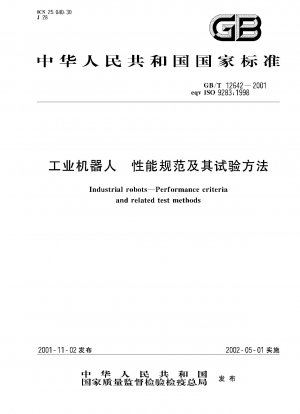GB/T 12642-2001
Industrial robots--Performance criteria and related test methods (English Version)
- Standard No.
- GB/T 12642-2001
- Language
- Chinese, Available in English version
- Release Date
- 2001
- Published By
- General Administration of Quality Supervision, Inspection and Quarantine of the People‘s Republic of China
- Status
- 2014-03
- Replace By
- GB/T 12642-2013
- Latest
- GB/T 12642-2013
- Scope
- This standard specifies the following performance indicators and test methods for manipulative robots: ---Pose accuracy and pose repeatability; ---Multi-directional pose accuracy changes; ---Distance accuracy and distance repeatability; ---Position stabilization time; ---Position overshoot; ---Pose characteristic drift; ---Interchangeability; ---Track accuracy and track repeatability; ---Reorientation track accuracy; ---Corner deviation; ---Track velocity characteristics; ---Minimum positioning time; ---Static compliance; ---Swing deviation. For the test of a specific robot, this standard does not specify which of the above performance indicators should be selected. The test items described in this standard are mainly used to research and test the indicators of a certain robot, but they can also be used for prototype test, type test or acceptance test. In order to compare the performance indicators of different robots, according to the provisions of this standard, the following parameters must be the same: the size of the test cube, test load, test speed, test track, test cycle and environmental conditions. Appendix A (standard appendix) gives the specific parameters used for comparative testing of pose characteristics and trajectory characteristics. This standard applies to all industrial robots defined in GB/T 12643. The term "robot" in this standard refers to industrial robots.
GB/T 12642-2001 history
- 2013 GB/T 12642-2013 Industrial robots.Performance criteria and related test methods
- 2001 GB/T 12642-2001 Industrial robots--Performance criteria and related test methods
